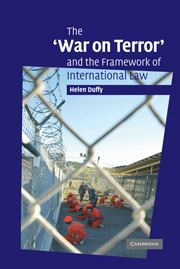3 - International responsibility and terrorism
Published online by Cambridge University Press: 06 August 2009
Summary
The question of responsibility for the events of September 11 permeates the discussion of lawful responses to those events, and as to against whom any such response should be directed. Was a state responsible for the September 11 attacks? Can al-Qaeda, bin Laden or other individuals be considered responsible under international law? To what extent do the permissible responses to 9/11 depend on the answers to these questions?
As will be apparent from the chapters that follow, state responsibility is more relevant to some aspects of the framework of responses discussed in this book than to others. State responsibility is not generally relevant to the application of the criminal law framework, discussed in the following chapter, although as discussed there it may be relevant to whether specific crimes (notably war crimes and aggression) were committed in the course of the September 11 attacks. By contrast, as discussed in Chapter 5, it is a controversial question whether state responsibility for an armed attack is a prerequisite to justify the use of force in self defence, or at least to justify attacking that state itself. Questions of ‘state responsibility’ are relevant, moreover, not only to the unfolding responses to 9/11 but, in turn, to the obligations of other states to react to those responses. In certain circumstances, the unlawful use of force, egregious violations of human rights and international humanitarian law (discussed at Chapters 5, 6 and 7 respectively), may trigger the right, or in exceptional circumstances the responsibility, of other states to take measures to end the wrong in question.
- Type
- Chapter
- Information
- Publisher: Cambridge University PressPrint publication year: 2005

